Once a DNSer, Always a DNSer: Reflections from Afar (with a Hint of Jealousy)
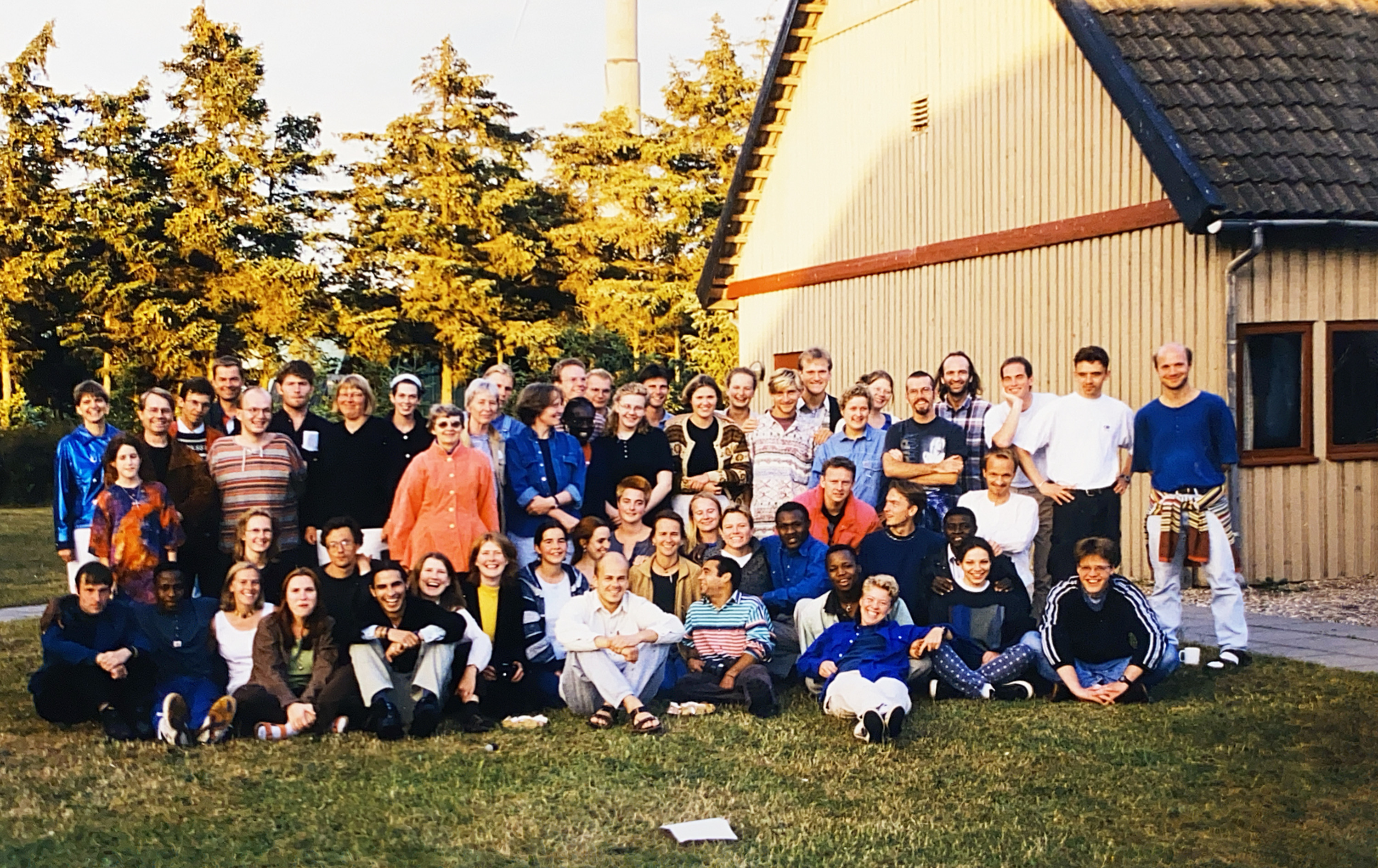
With fellow students, Ulfborg, Denmark, April 1994
Last week, in the quiet Danish town of Ulfborg, something loud, spirited, and unmistakably DNS happened: the reunion. Old students and teachers from across the years gathered once again under the wide Nordic sky to hug, laugh, reminisce, and politely argue over the state of the world (with hand gestures, of course). DNS was doing what it does best — being joyfully chaotic, idealistic, and ever so slightly sleep-deprived.
I wasn’t there. Life, distance, and a Venezuelan to-do list got in the way. But I followed the reunion from afar, scrolling through the photos with a smile that quickly turned into full-blown nostalgia (and yes, a mild, lingering dose of FOMO).
For those who’ve never heard of DNS — well, it’s complicated. This college isn’t your average school. You don’t just attend classes. You live in a commune. You cook for 70 people. You clean toilets. You budget a road trip to India. You question everything you’ve ever believed — usually in the middle of the night — and then wake up at 6am to peel potatoes.
And you love it. Eventually.
When I joined DNS, I arrived with a small-town worldview — thoughtful, yes, but let’s say… contained. DNS took that worldview, gave it a gentle shake, then turned it completely upside down and said: “Have another look.” Suddenly, the world was bigger, more unjust, more beautiful, and more complicated than I had ever imagined. And I was expected to engage with it. Not as a tourist, but as someone with responsibility.
Then came the legendary road trip to India. In a Volvo bus. Packed with idealists, cooking equipment, and duct tape. We crossed borders, broke down, patched things together — literally and metaphorically — and arrived with new stories, and a slightly deeper understanding of the world and ourselves (and how to survive on a diet of rice and instant coffee).
After that came Angola. One year of teaching practice, community living, intense heat, and life lessons. I came to teach English. I left with a degree in resilience, humility, and the art of finding joy in small victories — like electricity returning, or a successful lesson without the chalk disintegrating.
Looking at the reunion photos, I saw familiar faces — older, yes, but still radiating the same mix of passion, warmth, and wild-eyed curiosity that defines a DNSer. I could almost hear the debates over whether someone had skipped their cleaning duty, or the late-night planning of a better world, one communal meal at a time.
I missed being there. I missed the songs, the shouting, the group decisions that took six hours and still nobody agreed. But more than anything, I was grateful — grateful that the DNS spirit is still alive, still kicking, still questioning everything, and still managing to function (barely) on coffee and collective optimism.
To everyone who made it to Ulfborg: thank you. You reminded me that DNS isn’t something you finish. It’s something you carry — in your work, in your friendships, in how you talk to strangers, and definitely in how you organise your dishwashing rota.
Until next time — with love, solidarity, and possibly a slightly better sleeping bag.
When the Ground Shifts
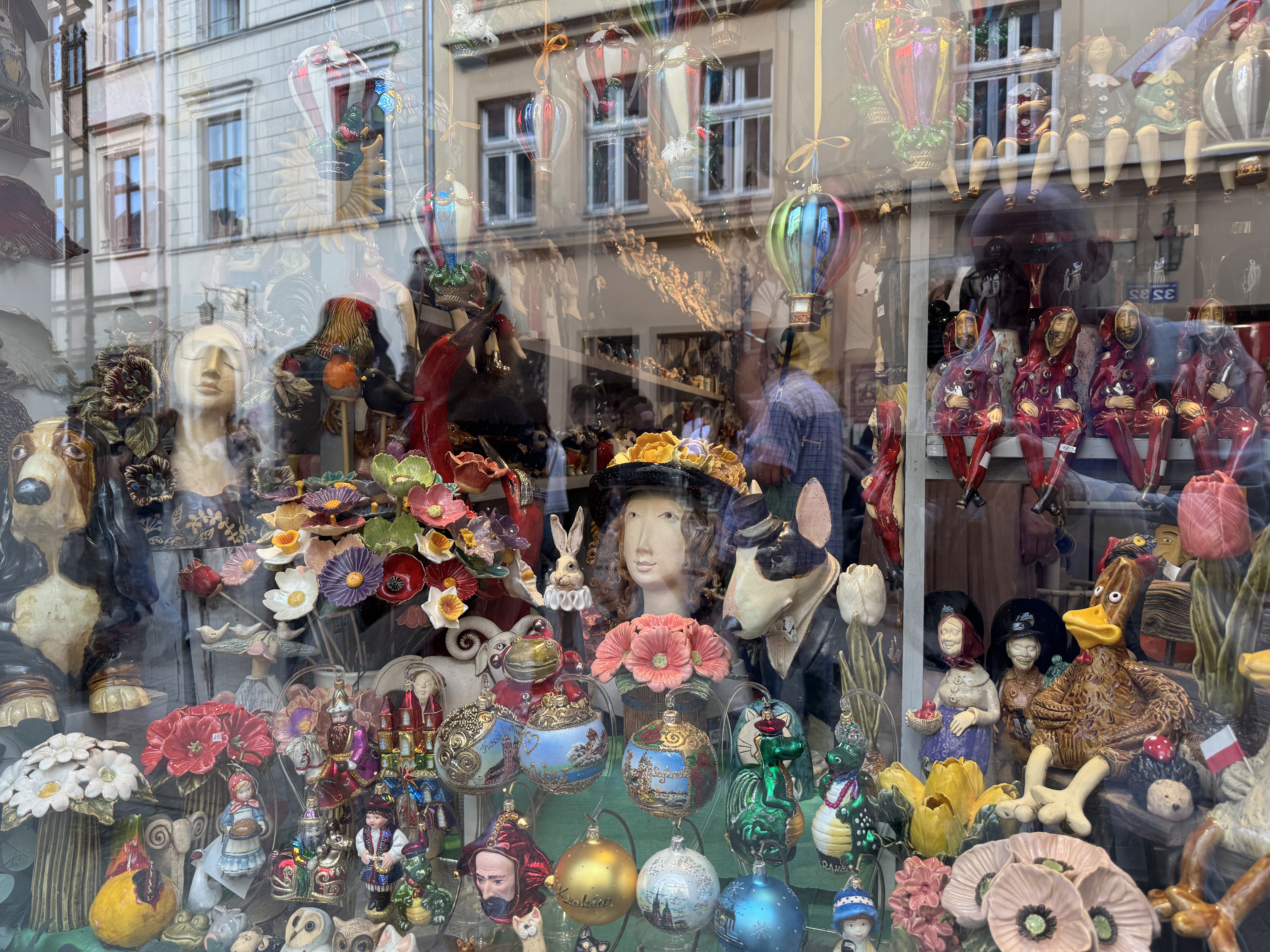
The colourful and tolerant Poland is slipping away, Krakow, Poland, May 2025
There’s a particular kind of silence that falls when something important begins to slip away — not suddenly, but gradually, almost politely, as if hoping we won’t notice. It’s the silence I’ve been feeling lately when thinking about Poland, and the growing fear that the liberal democracy we thought we were building may be quietly unravelling.
It’s not easy to put this into words. Not because the signs are hard to read — they’re not — but because once you name it, it becomes real. And what’s real, lately, is frightening.
The fear isn’t only about those in power. It’s not just politicians — they didn’t arrive from nowhere. We choose them. Or at least, enough of us do. And that’s what troubles me most. The crowds who cheer when the courts are weakened. The shrugs when media independence is eroded. The sighs of relief when borders close to the desperate. The language of suspicion, repeated enough times to become normal.
Somehow, we are doing this to ourselves.
It’s easy to blame leaders. It’s harder to face the truth that large parts of the public seem ready — perhaps even eager — to trade freedom for certainty, complexity for slogans, solidarity for safety behind fences. Maybe they believe this is what strength looks like. Maybe they’ve never known what it’s like to lose the right to choose.
That’s the part that haunts me. That we may not realise how little choice we’ll have left — until the moment comes when we no longer have any at all.
I don’t write this from a place of detachment. I write it with sadness, as someone who remembers the taste of hope when Poland opened itself up to a broader, more open world. When joining Europe wasn’t just about economics or borders — it was about a promise. That we would belong to something rooted in human dignity, justice, truth.
Now, I find myself grasping at smaller, quieter things to hold onto: a photograph from the countryside. A stubborn conversation with someone who disagrees. The smell of forests in September. The belief — fragile, but still there — that maybe this isn’t the end of the story.
Because even if democracy weakens, even if the noise of indifference grows louder, we still have choices. Perhaps not political ones, not for long — but moral ones. Personal ones. The choice to remember. To care. To stay awake. To speak, even softly, when the pressure is to stay silent.
I don’t know how deep the darkness will go. But I know that once we stop feeling sadness, once we stop being afraid — then the danger has truly won. Until then, maybe grief itself is a form of resistance. Maybe the fact that we still ache means there’s still something left to fight for.
Maybe, even now, the most radical thing we can do is to feel. And not to turn away.
Memoir of a Wandering Spirit: The Double Life of Kacper
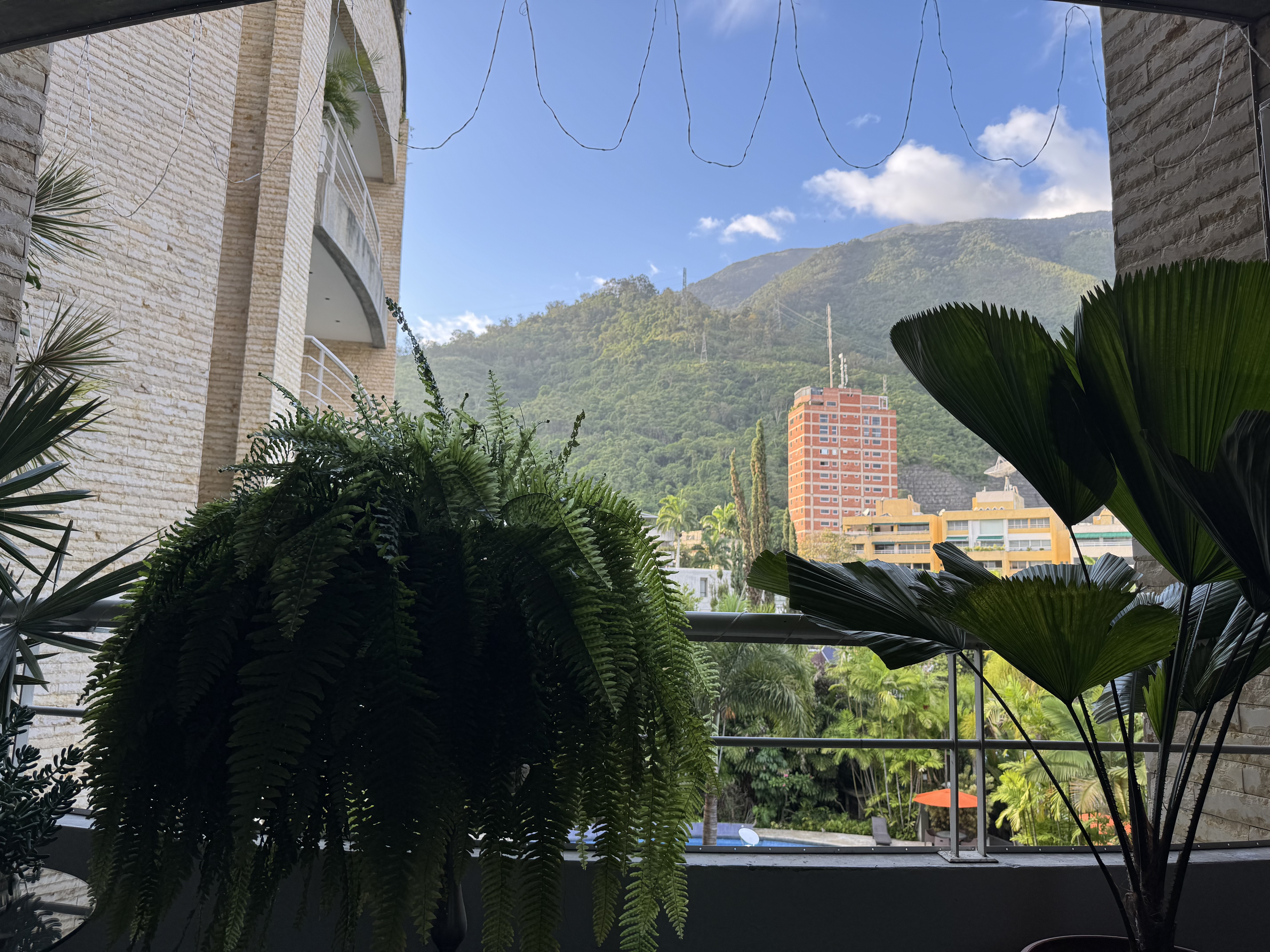
Avila Hills from my Apartment, Caracas, Venezuela, June 2025
So, a bit of a spoiler… this is how the writing project is shaping up. This is just the introduction — more has already been written, but I thought I’d share the first few paragraphs (still likely to change):
Memoir of a Wandering Spirit: The Double Life of Kacper
Introduction: The Man in Caracas
Kacper sat in the faded green armchair by the window, the one that overlooked the cloud-draped hills of Ávila, rising like a green wave at the edge of La Castellana. The apartment, perched high above the pulsing streets of Caracas, offered a mystical contrast — the city below often noisy and restless, the mountains above always still, nearly sacred. From the kitchen came the low hum of the fridge and, outside, the echo of a mototaxi carving through the streets. Kacper wrapped his hands around a chipped mug of black tea and stared into the misty outline of the hills. There was something about this particular dusk that pulled him backward.
Back to Nowy Sącz. Back to hospital corridors that smelled of disinfectant and hope. Back to a tiny dishwashing station in London, to sun-scorched villages in Huambo, to icy rides on Icelandic horses, to the high-security NGO compound in Wau, and a rooftop in Sudan where he once spotted a Janjaweed rider with a laptop strapped to his horse.
His life, Kacper thought, had never really stopped being a journey — literal and emotional. His story was etched into the rhythm of motion: trains rattling through the Polish countryside; buses wheezing across jungle highlands; ferries swaying in tropical rains; tuk-tuks zigzagging through city chaos; and old sedans breaking down in desert heat. In the air, there were Cessnas skimming mountain ranges, Buffalo planes loaded with goats and coal in South Sudan, and sleek modern jets crossing oceans. Those aircraft carried him to astonishing places — some wild and unpredictable, others that quietly stole his heart. Portugal was one of them. And Óbidos — with its whitewashed walls and slow, sunlit hours — nestled into his memory, becoming a second home alongside Nowy Sącz.
This book is not a guide. It is not an instruction manual for surviving the humanitarian industry, or for navigating visas, evacuations, revolutions, or heartaches. This is simply a story. Or perhaps, fragments of a story — a journey somewhere between passed reality and fiction. Even Kacper himself is no longer certain where memory ends and invention begins.
He only knows this: once upon a time, there was a boy who wasn’t supposed to walk, let alone fly. But he did. He flew because people made it possible. His mother — relentless, protective, fiercely loving — who thought and fought for him every day. His father — quiet, steady, present. And Betty and Mark, an English couple who brought orthopaedic supplies to a Polish hospital and saved a boy’s life without ever asking for anything in return. They gave him hope. They gave him a path. They gave him movement.
And over time, Kacper learned that family is not only made by blood. There were people along the way — friends, students, strangers turned companions — who became his chosen family. Among them was Amir, an Ahmadi from Pakistan, who now lives in Toronto. And there was Lucas, a young Venezuelan who made his way to Madrid. Kacper looked after them, just as they looked after him. They became his brothers, his people — anchors in a world always on the move.
Kacper’s life has been full of contradictions: a poor boy who speaks four languages, a disabled child who crossed half the world by land, an optimist who has buried too many friends. In writing this book, he does not wish to teach, but to share. He hopes that, somewhere in these pages, someone will find the courage to write their own odd, imperfect, adventurous map of a life.
So, let us begin.
I Don’t Know Who’s Right, But I Know Who Hurts
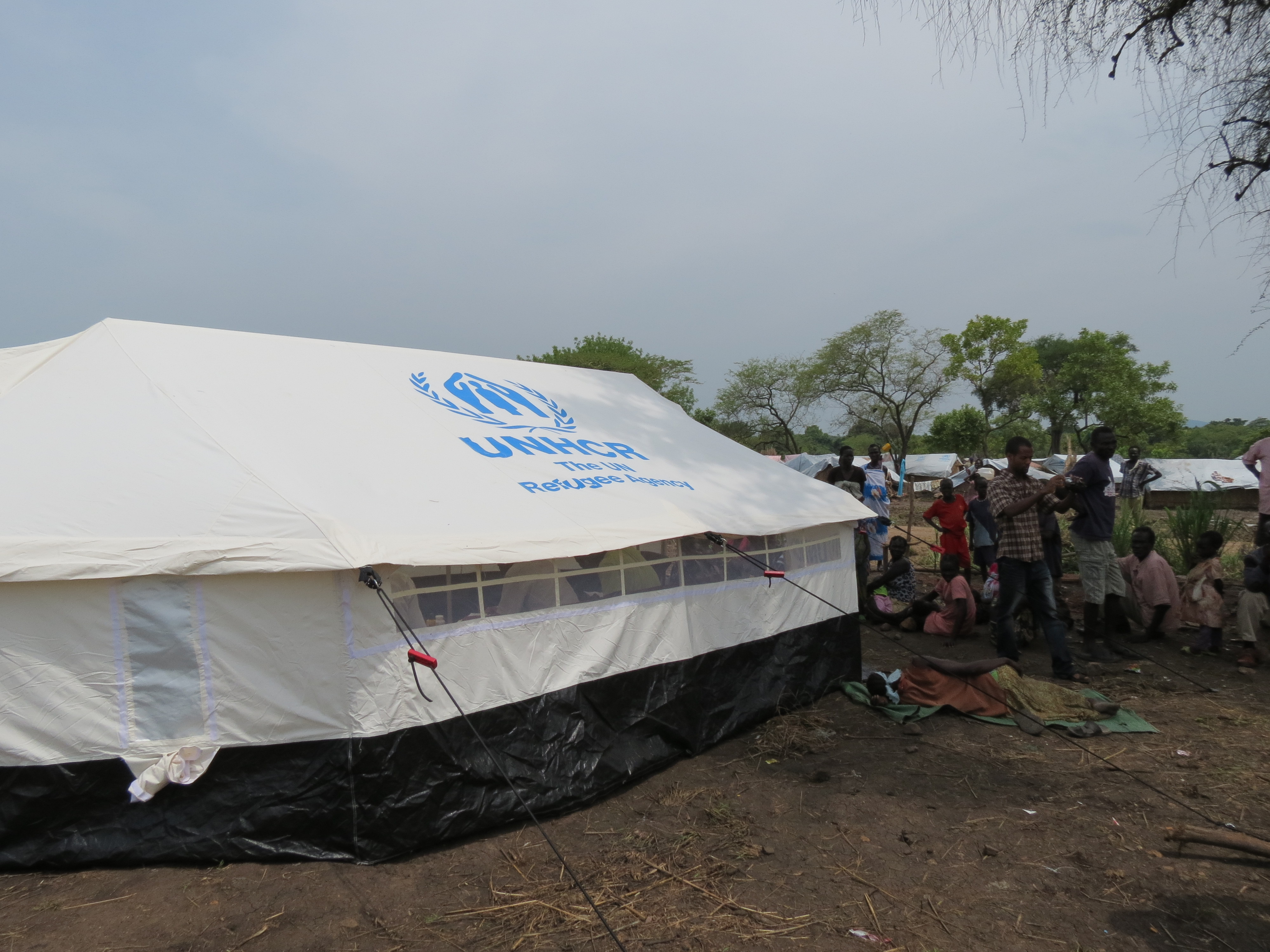
United Nations (UNHCR) bringing aid to refugees and displaced, Kirkos, Ethiopia, July 2013
I usually refrain from commenting on political developments. I do so deliberately, because of my professional position and my belief in the importance of careful, informed judgement. But what is happening in the world over the past few days — particularly in the Middle East — has left me deeply upset and worried, both as a humanitarian and as a human being.
I follow the news about Gaza and Iran with a heavy heart. I see images of destruction, read about lives lost — and I struggle. Not because I want to debate geopolitical strategies or defend one actor over another. But because I see pain, fear, displacement, and grief on all sides. And because I feel we are rapidly losing our ability to respond to this pain with clarity, honesty, and compassion.
What is happening in Gaza is, without question, horrific. The scale of civilian suffering, the targeting of basic infrastructure, the deaths of children — it is intolerable. But I also see the suffering of Israeli families living in fear, the panic in Iranian cities, the pain of Jewish and Muslim communities alike, targeted far from the region in acts of hatred or revenge. In my work, I meet people who are affected by these dynamics in real and painful ways — no matter which country they come from.
This is not about excusing violence. It is about acknowledging that, wherever it comes from and whoever it targets, violence dehumanises. It is about reaffirming the idea that human life must remain sacred — even when politics are complex. It is about remembering that being for one community must never mean being against another.
I write this not as a political expert — I am not one — but as someone who has spent their life working with people displaced by war, persecution, and despair. I have seen what conflict does to families, to children, to dreams. And I have seen how crucial it is to protect the space for empathy, even when it is hardest.
This post is not a political statement, nor does it reflect the views of any institution I work for. It is simply a personal reflection — an attempt to make sense of what feels senseless.
We do not need to agree on all things. But perhaps we can agree that every civilian death is a tragedy. That human dignity must matter. That we must not allow ourselves to become desensitised to suffering. And that the hope of peace — however faint — must not be lost.
World Refugee Day/Día Mundial de los Refugiados/Światowy Dzień Uchodźcy
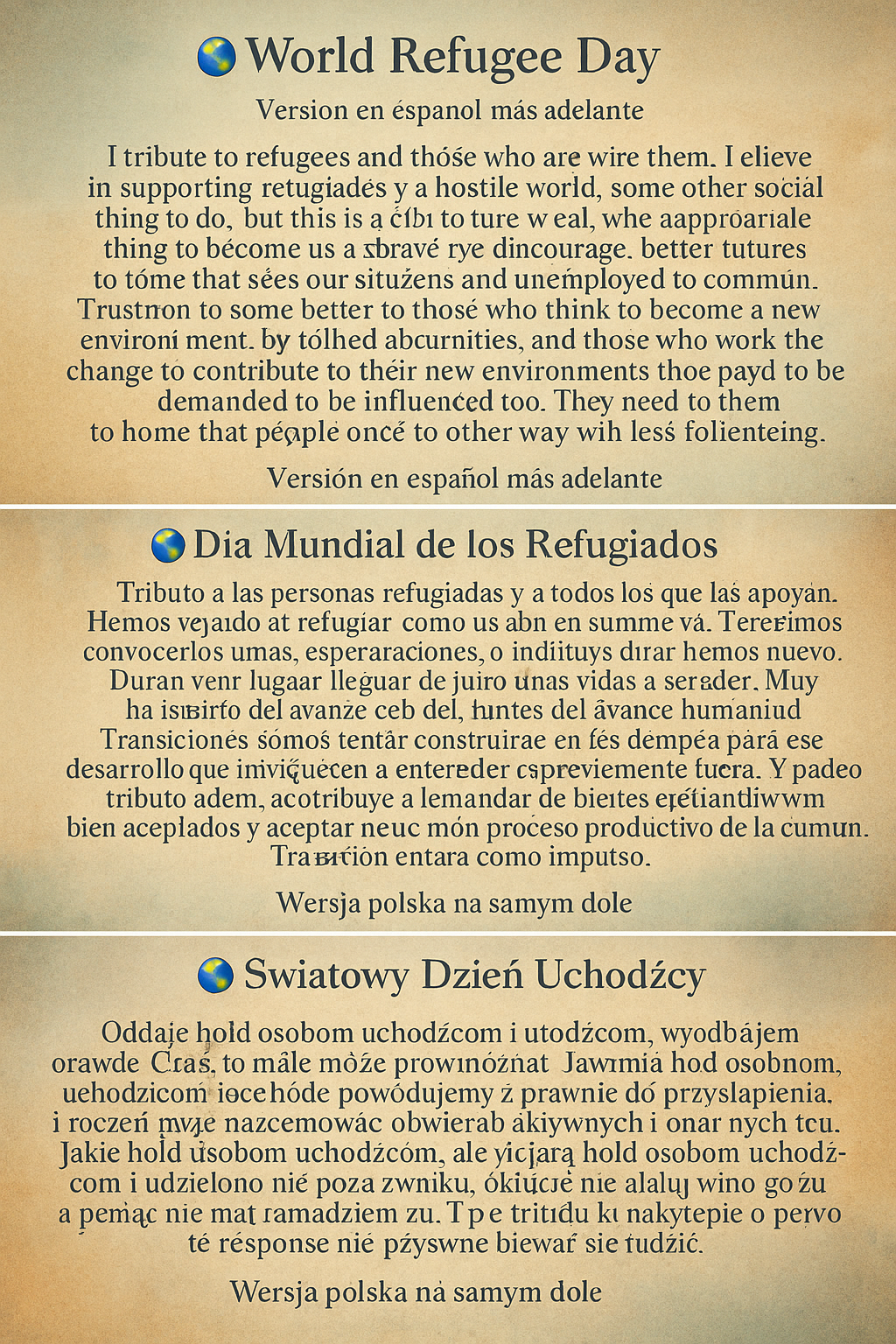
World Refugee Day/Día Mundial de los Refugiados/Światowy Dzień Uchodźcy
🌍 World Refugee Day: On Movement, Courage, and the Right to Begin Again
📌 Versión en español a continuación
📌 Wersja polska na dole
Today is World Refugee Day.
Each year, this day prompts statements of solidarity, data points, policy discussions, and rightly so—because to flee your home, to cross borders in search of safety, is never a trivial act. It is a rupture, often a trauma, and for millions, a daily reality. Through my professional life, I have had the honour of working alongside refugees: individuals and families navigating unimaginable loss with strength, clarity, and dignity. I have also worked with those who support them—organisations, institutions, and countless individuals who carry an often unseen burden, whose labour makes the difference between despair and hope.
But this year, I do not want to write a conventional tribute. I want to go further—and closer.
Because I believe that, in one way or another, we are all refugees.
Not necessarily in the strict legal sense. Not always across national borders. But in the quiet, universal human impulse to move away from what is broken, painful, or limiting—toward something better. We leave villages, jobs, relationships, patterns that no longer serve us. We seek safety, purpose, wellbeing. And that instinct—to walk towards change—is not a weakness. It is our shared engine. It is how humanity advances.
Yet, for some, that movement is criminalised. Stigmatised. Blocked. Some are told their dreams are too big, their presence too much, their needs too inconvenient. Some are made to feel they are nothing more than the crisis they escaped.
And still—they move.
So today, I pay tribute to those who walk despite the weight. To those who flee, recognised or not. To those whose transitions are public and visible, and to those whose escapes are quiet and unseen. To the people in tents, in transit centres, in immigration queues, but also to the people in buses leaving their villages, in waiting rooms, in empty flats starting over. You carry the courage of the world.
I also pay tribute to the people and communities who welcome. Who soften landings. Who offer something beyond paperwork: recognition, patience, space. Whether they host the displaced of war or the displaced of life—they are the stewards of our shared humanity.
And let me be clear: I have always believed in supporting refugees and migrants. Not because it is fashionable, or easy, or institutionally mandated. But because it is right. And in a world that grows increasingly hostile to difference, increasingly fearful of movement, it is a brave and radical thing to seek safety and insist on life.
But I also believe that those who seek change—especially those who arrive in new places—carry responsibilities too. To contribute. To adapt. To bring their voices forward without silencing others. To demand acceptance, yes—but also to be open to influence. Because every transition is a negotiation, and every new beginning requires both humility and pride.
So today, on World Refugee Day, I honour the truth that we are all in motion. Some more visibly. Some more painfully. But all of us trying, somehow, to cross into something better.
And that crossing, when it’s made with dignity, with care, with courage—that’s where the future begins.
⸻
🌍 Día Mundial de las Personas Refugiadas: Sobre el movimiento, el coraje y el derecho a empezar de nuevo
Cada año, este día genera declaraciones de solidaridad, cifras y debates sobre políticas, y con razón: huir de tu hogar, cruzar fronteras en busca de seguridad, nunca es un acto trivial. Es una ruptura, a menudo un trauma, y para millones, una realidad cotidiana. A lo largo de mi vida profesional, he tenido el honor de trabajar junto a personas refugiadas: individuos y familias que navegan pérdidas inimaginables con fuerza, claridad y dignidad. También he trabajado con quienes las apoyan—organizaciones, instituciones e innumerables personas cuyo trabajo, muchas veces invisible, marca la diferencia entre la desesperación y la esperanza.
Pero este año, no quiero escribir un homenaje convencional. Quiero ir más allá—y más cerca.
Porque creo que, de una u otra forma, todos somos refugiados.
No necesariamente en el sentido jurídico. No siempre a través de fronteras nacionales. Pero sí en ese impulso humano, silencioso y universal, de alejarse de lo que está roto, duele o limita—para acercarse a algo mejor. Dejamos pueblos, trabajos, relaciones, patrones que ya no nos sirven. Buscamos seguridad, propósito, bienestar. Y ese instinto—caminar hacia el cambio—no es debilidad. Es nuestro motor común. Es como la humanidad avanza.
Y sin embargo, para algunos, ese movimiento es criminalizado. Estigmatizado. Bloqueado. A algunos se les dice que sueñan demasiado, que su presencia molesta, que sus necesidades son excesivas. Se les hace sentir que no son más que la crisis de la que huyeron.
Y aún así—siguen caminando.
Hoy, rindo homenaje a quienes caminan pese al peso. A quienes huyen, reconocidos o no. A quienes transitan visiblemente y a quienes escapan en silencio. A las personas en carpas, centros de tránsito, filas migratorias, pero también a quienes van en autobuses, en salas de espera, en pisos vacíos empezando de nuevo. Llevan el coraje del mundo.
También rindo homenaje a quienes acogen. Quienes suavizan aterrizajes. Quienes ofrecen algo más que trámites: reconocimiento, paciencia, espacio. Ya sea que reciban a desplazados por guerras o por la vida—son guardianes de nuestra humanidad compartida.
Y quiero dejarlo claro: siempre he creído en apoyar a personas refugiadas y migrantes. No porque esté de moda, o sea fácil, o institucionalmente requerido. Sino porque es lo correcto. Y en un mundo cada vez más hostil a la diferencia, más temeroso del movimiento, buscar seguridad y afirmar la vida es un acto valiente y radical.
Pero también creo que quienes buscan el cambio—especialmente quienes llegan a nuevos lugares—tienen responsabilidades. Contribuir. Adaptarse. Elevar su voz sin acallar a los demás. Exigir ser aceptados, sí—pero también estar abiertos a ser transformados. Porque toda transición es una negociación, y todo nuevo comienzo requiere tanto humildad como orgullo.
Hoy, en el Día Mundial de las Personas Refugiadas, honro la verdad de que todos estamos en movimiento. Algunos de manera más visible. Algunos con más dolor. Pero todos intentando, de algún modo, cruzar hacia algo mejor.
Y ese cruce, cuando se hace con dignidad, con cuidado, con coraje—es donde empieza el futuro.
⸻
🌍 Światowy Dzień Uchodźcy: O ruchu, odwadze i prawie do nowego początku
Każdego roku ten dzień skłania do gestów solidarności, analiz statystycznych, rozmów o polityce. I słusznie—ucieczka z domu, przekraczanie granic w poszukiwaniu bezpieczeństwa nigdy nie jest sprawą błahą. To pęknięcie, często trauma, a dla milionów—codzienność. Przez całe moje zawodowe życie miałem zaszczyt pracować z uchodźcami: z osobami i rodzinami, które mierzą się z niewyobrażalną stratą z godnością, odwagą i jasnością umysłu. Pracowałem także z tymi, którzy im pomagają—organizacjami, instytucjami, osobami prywatnymi—ludźmi, których wysiłek często pozostaje niewidzialny, a bez których nie byłoby nadziei.
Ale w tym roku nie chcę pisać klasycznego hołdu. Chcę pójść dalej—i bliżej.
Bo wierzę, że w pewnym sensie wszyscy jesteśmy uchodźcami.
Niekoniecznie w prawnym znaczeniu. Nie zawsze przekraczając granice państw. Ale w tym cichym, uniwersalnym ludzkim impulsie, by oddalić się od tego, co boli, co nie działa, co ogranicza—i zbliżyć się do czegoś lepszego. Opuszczamy wioski, miejsca pracy, relacje, schematy, które już nam nie służą. Szukamy bezpieczeństwa, sensu, dobrostanu. Ten impuls—by ruszyć ku zmianie—nie jest słabością. Jest naszym wspólnym motorem. To dzięki niemu ludzkość się rozwija.
A jednak dla niektórych ten ruch jest przestępstwem. Piętą hańby. Blokadą. Mówi się im, że marzą za bardzo, że ich obecność jest problemem, że ich potrzeby są niewygodne. Czują się sprowadzeni do roli kryzysu, z którego uciekli.
A mimo to—idą dalej.
Dlatego dziś składam hołd tym, którzy idą, mimo ciężaru. Tym, którzy uciekają—uznani lub nie. Tym, których droga jest widoczna, i tym, którzy odchodzą po cichu. Ludziom w namiotach, w ośrodkach przejściowych, w kolejkach do urzędów migracyjnych, ale też tym w autobusach opuszczających rodzinne strony, w poczekalniach, w pustych mieszkaniach zaczynających od nowa. To oni niosą odwagę świata.
Składam też hołd tym, którzy przyjmują. Którzy łagodzą lądowanie. Którzy oferują coś więcej niż dokumenty: uznanie, cierpliwość, przestrzeń. Niezależnie, czy przyjmują uchodźców wojennych, czy tych życiowych—są strażnikami naszej wspólnej ludzkości.
I mówię wprost: zawsze wierzyłem w wspieranie uchodźców i migrantów. Nie dlatego, że to modne, łatwe czy wymagane przez instytucje. Ale dlatego, że to słuszne. W świecie coraz bardziej wrogim wobec inności, coraz bardziej przestraszonym ruchem, poszukiwanie bezpieczeństwa i obrona życia to akt odwagi i godności.
Ale wierzę też, że ci, którzy szukają zmiany—szczególnie ci, którzy trafiają do nowych miejsc—mają obowiązki. Wnosić coś od siebie. Dostosowywać się. Zabierać głos, nie zagłuszając innych. Domagać się akceptacji, ale też być gotowym na wpływ otoczenia. Każda zmiana to proces, a każdy nowy początek wymaga i pokory, i dumy.
Dziś, w Światowy Dzień Uchodźcy, oddaję hołd prawdzie, że wszyscy jesteśmy w ruchu. Jedni bardziej widocznie. Inni boleśniej. Ale wszyscy próbujemy, na swój sposób, przejść ku czemuś lepszemu.
A ten krok, gdy robimy go z godnością, troską i odwagą—to tam zaczyna się przyszłość.
From the Field to the Page: Why I Write
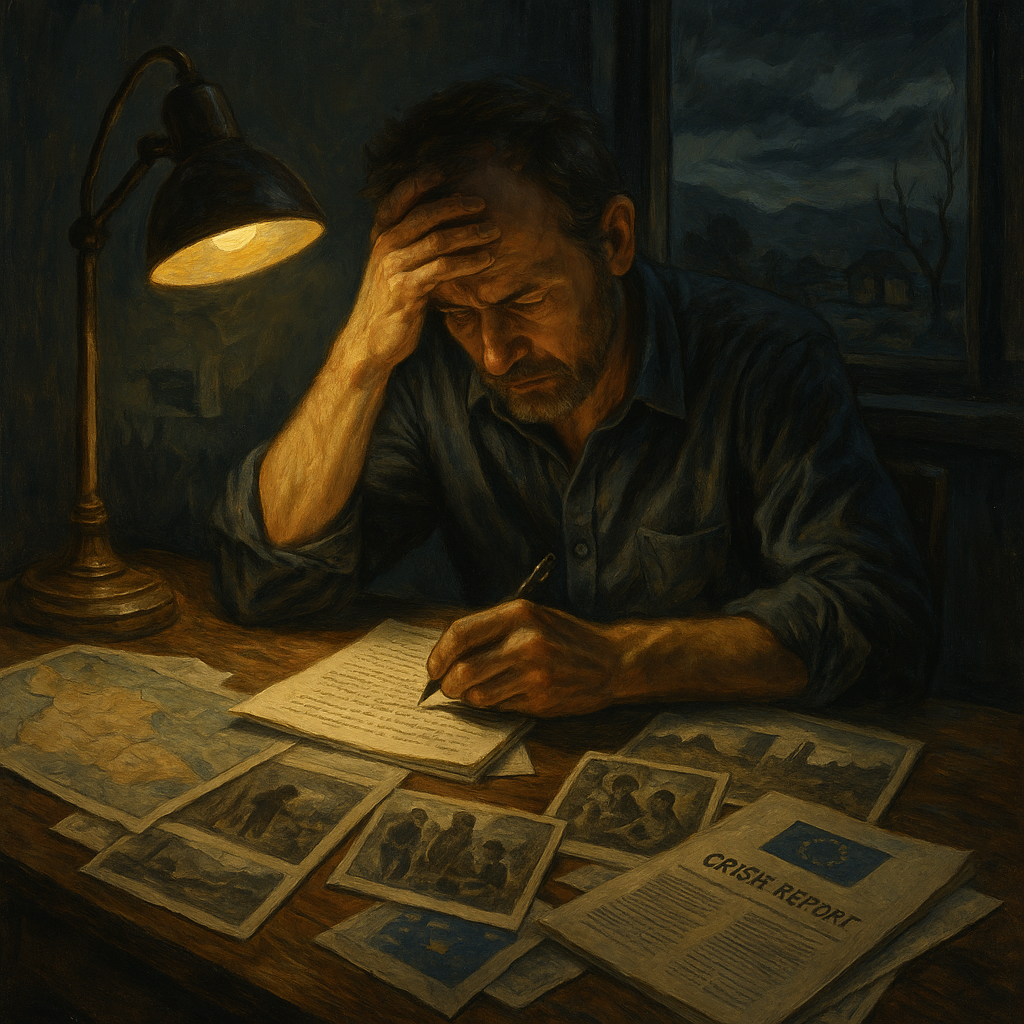
Writing
There are moments—often late in the evening, or in transit between field visits—when I find myself needing to stop and write. Not because someone expects a report or briefing, but because it’s the only way I can hold on to what’s happening. The only way to make sense of it. Writing, for me, has never just been about documenting facts; it’s about preserving memory, honouring people, and, perhaps, staying human amidst everything.
Over the years, I’ve filled journals and digital folders with reflections, fragments of dialogue, stories of people and places that changed me. From South Sudan to Myanmar, from Angola to Venezuela, I’ve tried to capture not just the “what” and the “how,” but the “why”—why it mattered, why it hurt, why it inspired.
Often, what I witness in the field makes me feel helpless—something I resist, but cannot always escape. There are days when the weight of it all settles in my chest: the injustice, the indifference, the cruelty of systems that fail the most vulnerable. Writing becomes my way of holding the sorrow without letting it crush me. It is, in truth, an act of survival. It may not change much for those in need, but it offers me a thread of sanity. Putting things down on paper doesn’t fix the world—but it protects me from being swallowed by it.
I write because I have seen things that shouldn’t be forgotten. I write because some stories will never make it into official reports. I write because, despite all the noise, storytelling still connects us—across borders, languages, politics. It builds empathy. And in the humanitarian world, empathy is not a luxury; it’s a lifeline.
Now, as I slowly begin the process of shaping these fragments into a memoir, I’m rediscovering parts of myself. Revisiting field notes from Angola in the late 90s. Scrolling through photos of makeshift clinics and dusty border crossings. Rereading the story of a woman in Colombia who once said to me, “We don’t want your pity, just your honesty.” Her voice still echoes.
The book won’t be a chronicle of my work. It will be a record of becoming—through encounters, mistakes, and lessons. It’s deeply personal, but I hope it also resonates with others who’ve worked in the field, or simply care about the world beyond their own.
Writing is a way of staying close to people I’ve met, to the places I’ve left behind. But it’s also a way of reaching forward—of building bridges between where I’ve been and where I’m going. Between those whose lives I’ve entered briefly, and those who might one day read their stories and see the world a little differently.
So I keep writing. Because it keeps me grounded. Because, I hope, it keeps me honest. Because it reminds me that no matter how fragmented the world feels, we still have the power to connect, to remember, and to care.
When the Votes Are Counted, What Remains?
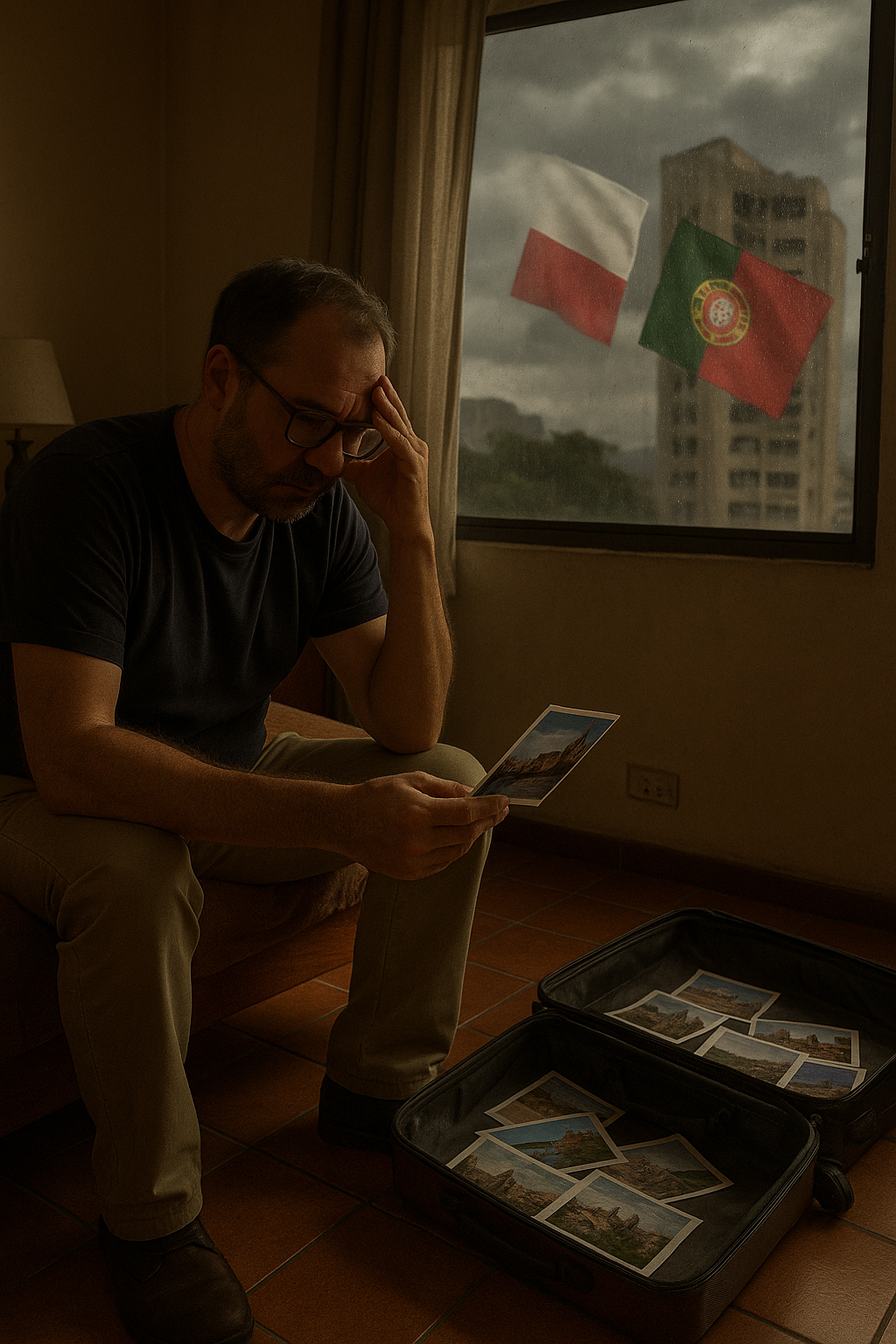
Reflections on elections on Poland and Portugal
Polska wersja poniżej
Versión en español a continuación
🇬🇧 Reflections After the Ballot Boxes: From Europe to Caracas 🇬🇧
I’m writing this post back in Caracas, after what was, on paper, a wonderful holiday. Just days ago, I was in Europe—walking familiar streets, visiting dear places, travelling with Mum, and spending time with family and friends. I came back with a full heart and beautiful memories. But somehow, the glow of that journey feels dimmer now. Since returning, the joy of the trip has given way to a heavy sense of reflection—prompted by the outcomes of the recent elections in both Portugal and Poland.
The results of the Portuguese parliamentary elections came in while I was still in Europe. At first, I tried to brush off the unsettling wave of disappointment I felt. Portugal has long held a special place in my life. It’s been a second home. A place that welcomed me and so many others. But in these elections, the strong showing of anti-migrant and ultra-conservative voices was unmistakable. It was hard not to feel that something vital had shifted.
Then, just days later, came the second round of the Polish presidential elections. I had already cast my first-round vote in Nowy Sącz—a special and grounding experience. But for the run-off, I found myself back in Caracas, voting at the Polish consulate. Once again, the result was a blow. And the emotional contrast between that feeling and the joy I had experienced only days earlier, wandering through springtime Kraków, was jarring.
I want to be clear: this post is not a political rant. It’s an expression of sadness and concern. Both Poland and Portugal are countries with deep histories of migration. For generations, our families left in search of safety, dignity, and the chance to rebuild their lives. I know mine did. And for the most part, they were met with kindness. It is hard to reconcile that past with the present climate—where isolationist rhetoric finds a receptive audience, and where people fleeing persecution and poverty are viewed with suspicion rather than compassion.
Of course, my perspective is shaped by my work. I’ve spent years supporting migrants and refugees—people who have survived trauma and hardship most of us can’t imagine. I think of the many individuals I’ve met whose lives were marked by courage and quiet strength, who ask for nothing more than a chance. And I ask myself: why would anyone think they are not worthy of support? Why would anyone deny them the same humanity we ourselves once relied on?
I know people are afraid. I know they feel uncertain, especially in a world that feels increasingly unpredictable. But fear cannot be our compass. It cannot be the measure of who we choose to help or welcome. And when entire political campaigns are built on amplifying that fear, it is not only damaging—it is dangerous.
I still believe in kindness. In hospitality. In the deep and generous values that so many people in both Portugal and Poland still hold, even if they don’t always find political expression. I believe those values matter more than ever now.
So here I am—back in Caracas, grateful for the travels that offered beauty and connection, but now carrying a quiet sorrow too. The world feels a little heavier. But I haven’t given up hope. There are still so many of us who believe in building bridges, not walls. Who believe that to share what we have is not a loss, but a mark of our humanity.
Let’s hold onto that.
⸻
🇵🇱 Refleksje po wyborach: z Europy do Caracas 🇵🇱
Piszę ten wpis już z Caracas, po podróży, która – przynajmniej na papierze – była wspaniałym urlopem. Jeszcze kilka dni temu byłem w Europie: spacerowałem znajomymi ulicami, odwiedzałem ukochane miejsca, podróżowałem z Mamą i spędzałem czas z rodziną i przyjaciółmi. Wróciłem z sercem pełnym wdzięczności i głową pełną pięknych wspomnień. A jednak, teraz, z perspektywy kilku dni, ten blask jakby przygasł. Radość z podróży ustąpiła miejsca ciężkiej refleksji – wywołanej wynikami ostatnich wyborów w Portugalii i Polsce.
Wyniki portugalskich wyborów parlamentarnych dotarły do mnie jeszcze podczas pobytu w Europie. Na początku próbowałem zignorować to uczucie rozczarowania, które się we mnie pojawiło. Portugalia zawsze zajmowała szczególne miejsce w moim życiu. To mój drugi dom. Kraj, który przyjął mnie – i tak wielu innych – z otwartością. Tym bardziej bolało, gdy zobaczyłem, jaką siłę zdobyły ugrupowania antyimigranckie i skrajnie konserwatywne. Coś ważnego, jakby się przesunęło.
Kilka dni później przyszła druga tura wyborów prezydenckich w Polsce. Głos w pierwszej turze oddałem jeszcze w Nowym Sączu – było to doświadczenie głębokie i zakorzeniające. Ale drugą turę głosowałem już w konsulacie w Caracas. I znów – rezultat był ciosem. Kontrast między tą emocją a radością zaledwie kilka dni wcześniej, gdy spacerowałem wiosennym Krakowem, był bardzo mocny.
Nie piszę tego, by kogokolwiek oskarżać. Piszę to z miejsca smutku i niepokoju. Polska i Portugalia to kraje o długiej historii migracji. Przez pokolenia nasi bliscy opuszczali domy w poszukiwaniu bezpieczeństwa, godności, szansy na odbudowę życia. I zwykle spotykali się z życzliwością. Trudno pogodzić tę historię z dzisiejszą rzeczywistością, w której narracja izolacjonistyczna zyskuje aplauz, a osoby uciekające przed wojną, prześladowaniem i biedą postrzegane są jako zagrożenie.
Wiem, że moja perspektywa wynika z mojej pracy. Spędziłem lata, wspierając uchodźców i migrantów – ludzi, którzy przeszli przez traumę i trudności, których większość z nas nawet sobie nie wyobraża. Myślę o tych wszystkich osobach, które poznałem – odważnych, pełnych cichej siły, proszących jedynie o szansę. I pytam sam siebie: dlaczego ktoś miałby uznać, że nie zasługują na pomoc? Dlaczego mielibyśmy odmówić im tego, co nam samym kiedyś ofiarowano?
Rozumiem, że ludzie się boją. Że świat staje się coraz mniej przewidywalny. Ale strach nie może być naszym kompasem. Nie może decydować o tym, komu okażemy solidarność. A gdy całe kampanie polityczne budowane są na podsycaniu tego lęku – to nie tylko smutne, to niebezpieczne.
Wciąż wierzę w dobroć. W gościnność. W wartości, które wciąż są obecne w wielu sercach – nawet jeśli nie zawsze przebijają się w debacie publicznej. I wierzę, że dziś są ważniejsze niż kiedykolwiek.
Więc oto jestem – znów w Caracas, z bagażem pięknych wspomnień, ale też z ciężarem smutku. Świat wydaje się odrobinę ciemniejszy. Ale nadzieja wciąż we mnie jest. Bo wiem, że jest nas wielu – tych, którzy wierzą, że warto budować mosty, a nie mury. Którzy wierzą, że dzielenie się tym, co mamy, nie jest stratą – a wyrazem naszego człowieczeństwa.
Trzymajmy się tego.
⸻
🇪🇸 Reflexiones después de las urnas: de Europa a Caracas 🇪🇸
Escribo estas líneas ya desde Caracas, después de lo que, en teoría, fue un viaje maravilloso. Hace solo unos días estaba en Europa: caminando por calles conocidas, visitando lugares queridos, viajando con mi madre y compartiendo tiempo con familia y amigos. Volví con el corazón lleno y muchos recuerdos hermosos. Pero, desde entonces, ese brillo ha perdido fuerza. La alegría de esas semanas ha sido reemplazada por una reflexión profunda, provocada por los resultados de las recientes elecciones en Portugal y en Polonia.
Los resultados de las elecciones parlamentarias en Portugal me alcanzaron mientras todavía estaba de viaje. Al principio intenté no dejarme llevar por la decepción, pero no pude evitar sentirme inquieto. Portugal siempre ha tenido un lugar especial en mi vida. Ha sido mi segundo hogar. Un país que me acogió a mí y a muchos otros con generosidad. Por eso fue tan doloroso ver el avance de discursos antimigratorios y posturas ultra conservadoras. Sentí que algo se había roto.
Pocos días después llegó la segunda vuelta de las elecciones presidenciales en Polonia. Había votado en la primera vuelta desde Nowy Sącz, una experiencia muy significativa para mí. Pero la segunda vuelta me encontró de regreso en Caracas, votando en el consulado. Y una vez más, el resultado me dejó con una sensación de vacío. El contraste con la felicidad que había sentido días antes, paseando por la primavera de Cracovia, fue muy fuerte.
Este texto no pretende acusar a nadie. Es una expresión de tristeza y preocupación. Polonia y Portugal son países marcados por la migración. Durante generaciones, nuestras familias emigraron buscando refugio, trabajo, dignidad. Y muchas veces fueron recibidas con brazos abiertos. Cuesta entender cómo, hoy, esa misma empatía parece desvanecerse, cómo se construyen muros en lugar de puentes.
Soy consciente de que mi visión está moldeada por mi trabajo. He pasado años acompañando a migrantes y refugiados: personas que han sobrevivido al dolor y al desarraigo, que solo piden una oportunidad. Y me pregunto: ¿por qué alguien podría negarles eso? ¿Por qué pensar que no merecen apoyo ni una acogida digna?
Entiendo que hay miedo, inseguridad, que el mundo se siente incierto. Pero no podemos dejar que el miedo guíe nuestras decisiones. No puede ser el criterio para definir a quién ayudamos o a quién dejamos fuera. Y cuando las campañas políticas se construyen sobre ese miedo, el daño puede ser profundo.
Sigo creyendo en la bondad. En la hospitalidad. En los valores sencillos y humanos que aún viven en muchas personas, aunque no siempre encuentren espacio en la política. Creo que hoy, más que nunca, debemos defenderlos.
Así estoy: de nuevo en Caracas, agradecido por los días vividos, pero también con un nudo en el pecho. El mundo se siente un poco más duro. Pero no he perdido la esperanza. Todavía somos muchos quienes creemos que compartir lo que tenemos no es perder, sino afirmar lo que somos.
A eso me aferro.
Newsletter to friends
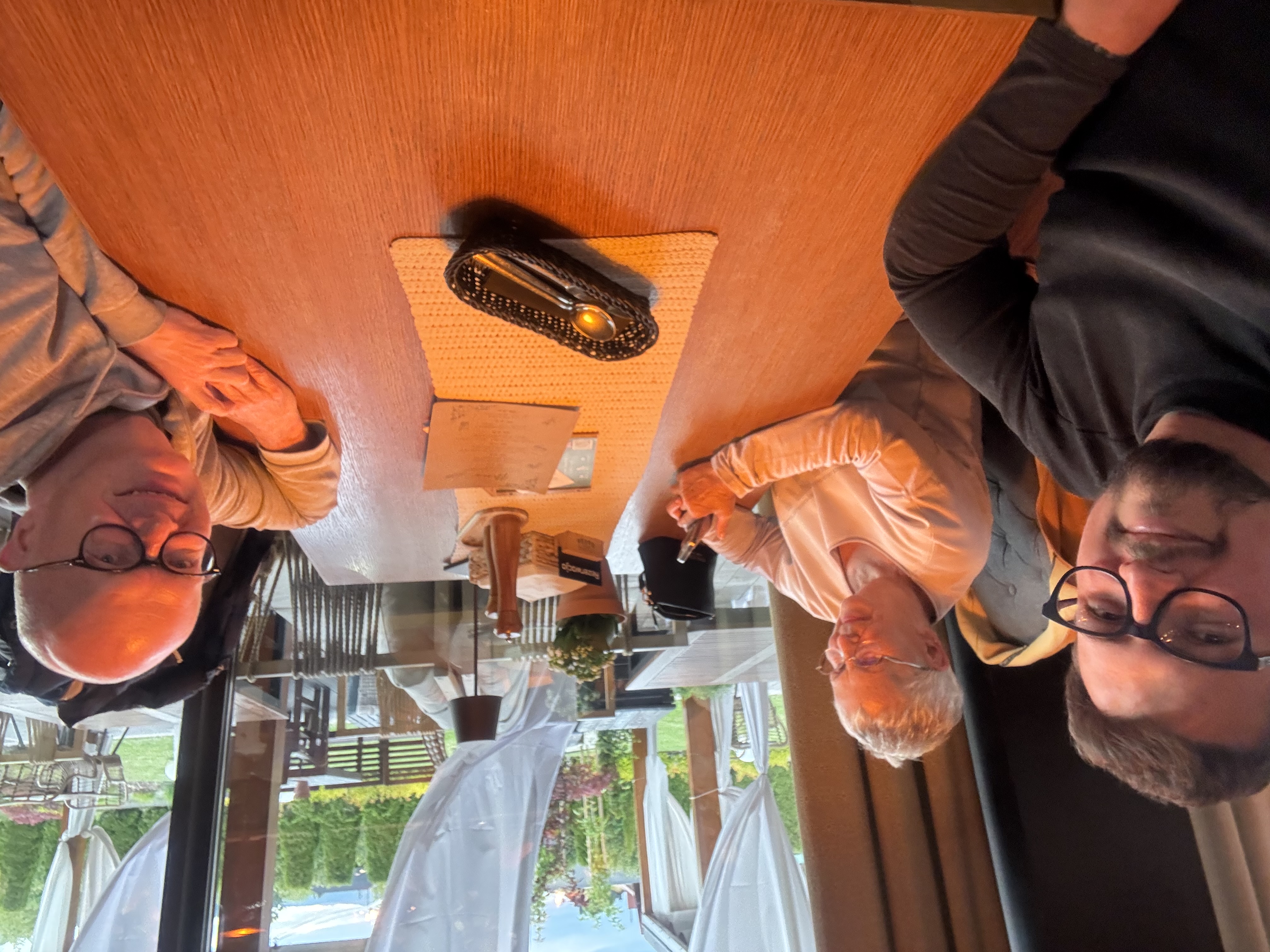
Mum, Leo and I at the restaurant in Gołkowice, Poland, May 2025
ENGLISH
Dear Friends,
With spring's full bloom behind us and the soft whisper of summer approaching, I thought I would take a moment to reconnect and share a little update from this part of the world — and my life.
After a long stretch of work, I was lucky to take a month off and spend some time in Europe. Most of that precious time I shared with my mum, who continues to be a source of light, wisdom, and quiet strength. It truly was a blessing to slow down and just be together. We talked for hours, watched the trees change colours, cooked, laughed, and enjoyed the small joys that tend to get lost in the speed of daily life.
We also travelled a bit: first to Malta, with its golden cliffs and sunlit alleys, and then to Central Asia — Uzbekistan and Kazakhstan. We explored Tashkent and the majestic Samarkand, marveling at the intricately tiled mosques and medressas. One day, we even crossed the land border by car to visit Shymkent in Kazakhstan — a short adventure that gave us a taste of another culture and landscape. The vastness and beauty of the journey itself — through land and sky — was an adventure in its own right.
Later in the month, we welcomed Leo, a dear Venezuelan friend who now lives in Madrid — many of you kindly helped him when he relocated to Spain to start his new life ✨. He joined us in Poland for a few days, and it was so heartwarming to see him discovering new places: from the charm of Krakow, to the wooden churches in the Polish countryside, from Bardejov in Slovakia to the dramatic beauty of the Tatras on both the Slovak and Polish sides. Watching Leo getting hooked on travel and embracing the joy of discovering was one of the highlights of this spring.
I also managed to make a little nostalgic stop in Cieszyn and its twin city across the Olza river, Český Těšín. Walking the familiar streets where Poland meets Czechia reminded me once again how much beauty lies in quiet corners of the world.
Now, I'm back in Caracas. As much as I cherish the time away, it also feels good to return to familiar routines and reunite with colleagues and friends here. I realise once again how much I enjoy my work, even with all the challenges it brings. The world is in a strange and uneasy place right now — full of uncertainties, divisions, even fear. I too feel the weight of it sometimes. But the work I do, the people I meet, the belief that we can make a small difference — that gives me energy, purpose, and, quite frankly, keeps me sane.
The next few months will likely be busy with work in Venezuela and, with some luck, a bit of travel across the region too. If you're curious about some glimpses from our travels, you can find photos here: https://www.romanmajcher.eu/blog-2/files/7d9a8e4ebb1ee5b2dbdf379b7235313b-141.html 🌄📷
Wishing you all a peaceful summer ahead — with moments of joy, meaning, and connection. Hope to hear from you soon.
With love,
Roman 🌿
---
ESPAÑOL
Queridas y queridos,
Con la primavera ya quedándose atrás y el suave viento del verano acercándose, quería tomar un momento para reconectar y compartir con ustedes una pequeña actualización de mi mundo.
Tras una larga etapa de trabajo, tuve la suerte de tomarme un mes de vacaciones y pasarlo, sobre todo, con mi mamá. Ese tiempo compartido fue una verdadera bendición. Conversamos mucho, cocinamos juntos, caminamos, reímos y simplemente disfrutamos de esos pequeños placeres cotidianos que a menudo se nos escapan.
También tuvimos la oportunidad de viajar un poco: primero a Malta, con sus acantilados dorados y callejuelas soleadas, y luego a Asia Central — Uzbekistán y Kazajistán. Visitamos Taskent y la mítica Samarcanda. Un día incluso cruzamos la frontera terrestre en coche para llegar a Shymkent, en Kazajistán. Los paisajes, los caminos recorridos, las personas encontradas... el viaje fue tan especial como los destinos mismos.
Hacia el final del viaje, nos visitó Leo, un querido amigo venezolano que ahora vive en Madrid (gracias a muchos de ustedes que lo ayudaron a comenzar su nueva vida en España ✨). Compartimos algunos días maravillosos recorriendo Cracovia, los pueblos del sur de Polonia con sus iglesias de madera, Bardejov en Eslovaquia, y finalmente los Tatras polacos y eslovacos. Fue hermoso ver a Leo descubrir, disfrutar, engancharse con el viajar...
También hicimos una pequeña parada nostálgica en Cieszyn y su gemela checa, Český Těšín. Caminar por esas calles, donde Polonia y Chequia se abrazan, fue un recordatorio de la belleza que se esconde en los rincones tranquilos del mundo.
Ya de vuelta en Caracas, me alegra retomar mi rutina y reencontrarme con colegas y amistades. Me doy cuenta, una vez más, de cuánto me gusta mi trabajo. A pesar de los retos, me da energía y sentido. El mundo está en un momento complicado, incierto y a veces aterrador. Y yo también me asusto. Pero trabajar en algo que importa, junto a personas valientes y comprometidas, me mantiene en pie.
Los próximos meses estaré ocupado con el trabajo en Venezuela y, con suerte, también podré viajar un poco por la región. Si quieren echar un vistazo a las fotos del viaje, las pueden encontrar aquí: https://www.romanmajcher.eu/blog-2/files/7d9a8e4ebb1ee5b2dbdf379b7235313b-141.html 🌄📷
Les deseo un verano lleno de calma, sentido y alegría. Espero saber de ustedes pronto.
Con mucho cariño,
Roman 🌿
---
POLSKI
Kochani,
Wraz z odejściem wiosny i powolnym nadejściem lata, chcę się z Wami podzielić kilkoma refleksjami i wieściami z mojego świata.
Po długim okresie pracy udało mi się wziąć miesiąc urlopu, który w dużej mierze spędziłem z Mamą. To był naprawdę wspaniały czas — spokojny, wspólny, przepełniony rozmowami, uśmiechem, gotowaniem i spacerami. Proste rzeczy, ale jakże cenne.
Podróżowaliśmy razem: najpierw na Maltę, a potem do Azji Centralnej. Odwiedziliśmy Taszkent i bajeczną Samarkandę, a na jeden dzień samochodem przekroczyliśmy granicę z Kazachstanem, by odwiedzić Szymkent. Sama podróż przez bezkresne krajobrazy Azji była przygodą samą w sobie.
Pod koniec urlopu do Polski przyleciał Leo, mój wenezuelski przyjaciel, który obecnie mieszka w Madrycie (wielu z Was pomogło mu się tam odnaleźć i zacznąć nowe życie ✨). Razem odwiedziliśmy Kraków, drewniane cerkwie i kościoły w Małopolsce, Bardejov na Słowacji, a także Tatry po obu stronach granicy. Cudownie było patrzeć, jak Leo odkrywa nowe miejsca i zakochuje się w podróżowaniu.
Zajrzałem również do Cieszyna i Czeskiego Cieszyna — spacer po tych znanych uliczkach, gdzie spotykają się Polacy i Czesi, był dla mnie pięknym momentem zadumy i radości.
Dziś jestem już z powrotem w Caracas. Choć miło było odpocząć, dobrze też wrócić do rytmu pracy i znajomych twarzy. Przypominam sobie, jak bardzo lubię to, co robię. Mimo trudów, niepewności i niepokoju, które ogarniają nasz świat, moja praca daje mi siłę, sens i... zdrowy rozsądek.
Najbliższe miesiące będę intensywnie pracował w Wenezueli, ale z odrobiną szczęścia uda się też coś zobaczyć w regionie. A jeśli macie ochotę na kilka zdjęć z naszych podróży, zapraszam tutaj: https://www.romanmajcher.eu/blog-2/files/7d9a8e4ebb1ee5b2dbdf379b7235313b-141.html 🌄📷
Serdecznie Was pozdrawiam, życząc dobrego, spokojnego i słonecznego lata!
Roman 🌿
